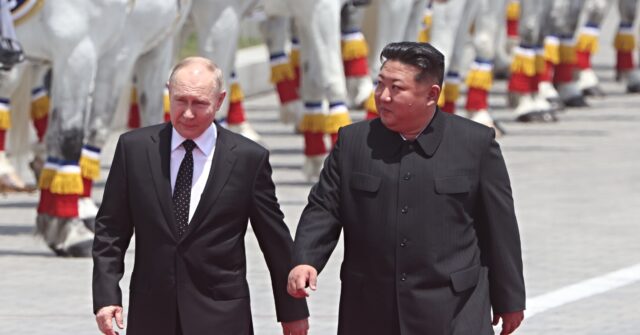On the occasion of Vladimir Putin’s birthday, North Korean leader Kim Jong-un sent a heartfelt letter to his Russian counterpart, referring to him as his “closest comrade.” The message, prominently featured in North Korean state media, extolled the deep-rooted ties between North Korea and Russia, emphasizing the hope for further strengthening their relationship. This expression of camaraderie stood in striking contrast to Kim’s less effusive and notably belated message to Chinese leader Xi Jinping the previous day, which marked the 75th anniversary of China’s fall to communism and lacked any personal flattery towards Xi.
Historically, China has been North Korea’s primary ally. However, in recent months, Putin has actively sought to bring North Korea closer into Russia’s sphere of influence. This shift has been highlighted by the signing of a mutual defense treaty between the two nations in June, which incidentally followed escalating rumors regarding North Korea’s provision of military support to Russia amid its invasion of Ukraine. In his letter, Kim alluded to their alliance as “invincible” and reaffirmed North Korea’s unwavering support for the Russian military’s efforts, further indicating the shift in Pyongyang’s foreign policy orientation.
While Kim’s message to Putin was a display of warm friendship, his correspondence with Xi was notably tepid, focusing more on the diplomatic relationship rather than any personal connection. The reduced praise was evident in the absence of the phrase “esteemed comrade” when referencing Xi, marking a shift from previous messages that were often filled with more enthusiastic tones. Reports indicated that Kim’s message to Xi was published less prominently in state newspapers, reinforcing the notion that the Sino-North Korean relationship may be experiencing some strain despite their historically aligned ideologies.
Tensions between North Korea and China have emerged, particularly as Kim’s recent engagements have increasingly leaned towards strengthening ties with Russia instead. Analysts have pointed out that, while both nations share similar ideologies and support each other’s causes, disagreements occasionally surface, complicating their relationship. Xi’s previous message, which expressed a desire for improved strategic communication, suggests an awareness of the shifting dynamics and an effort to recalibrate relations that may feel frayed.
In a nutshell, the geopolitical landscape surrounding North Korea has experienced a significant reconfiguration over the past year, as Kim has sought to deepen ties with Russia at the potential expense of its long-standing partnership with China. Kim’s visit to Russia and the subsequent gifting of military technology highlights this burgeoning alliance, which marks a shift back to more Soviet-era commitments between the two nations. Conversely, the less warm exchanges with Xi indicate that North Korea’s pivot towards Russia may lead to a reevaluation of its relations with China.
Kim’s overtures toward Russia, epitomized by the mutual defense treaty and the warm birthday messages exchanged, reveal an agenda that prioritizes strategic partnerships aligned with North Korea’s interests. The diplomatic landscape is now characterized by a nuanced interplay of loyalty and pragmatism, with Kim seeking to consolidate power and foster allies that align with his regime’s aspirations. As North Korea navigates these relationships, the broader implications for regional stability and international politics will continue to play a critical role in shaping future dynamics among these three influential players on the global stage.

